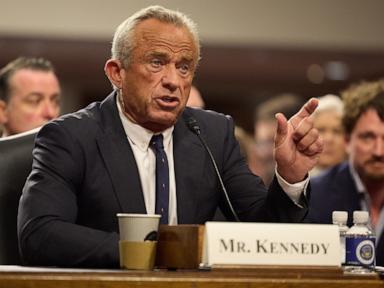
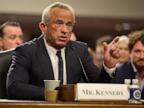

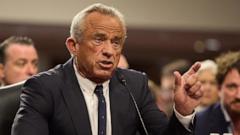
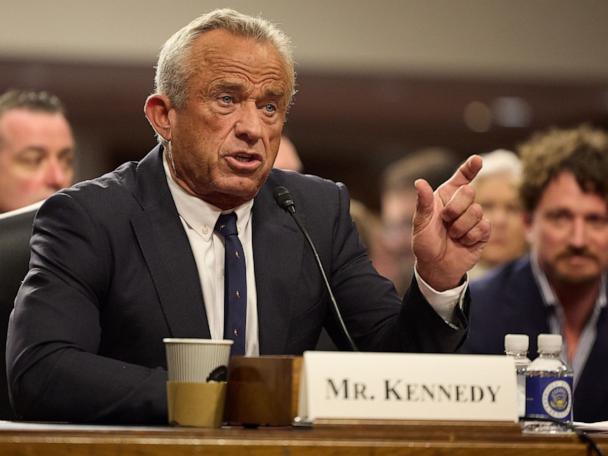
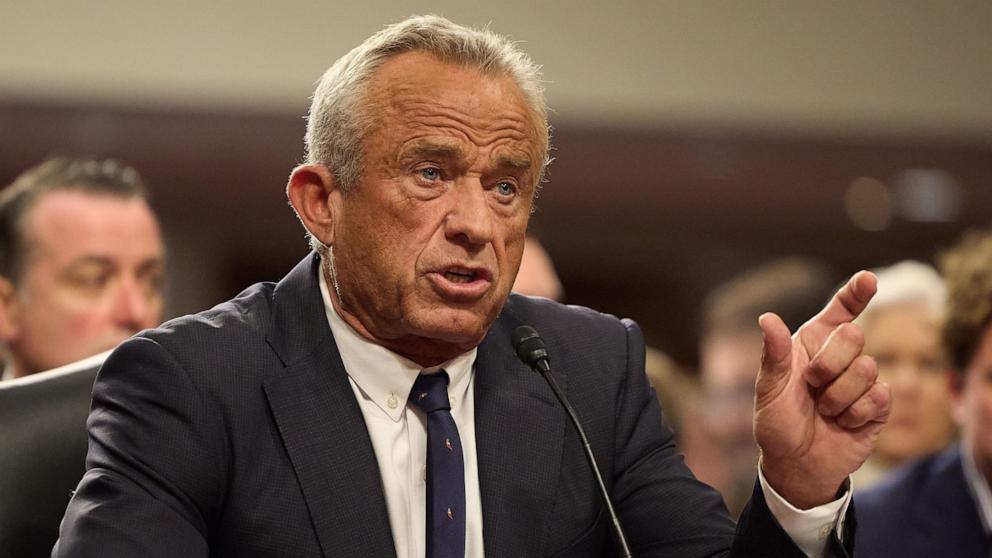
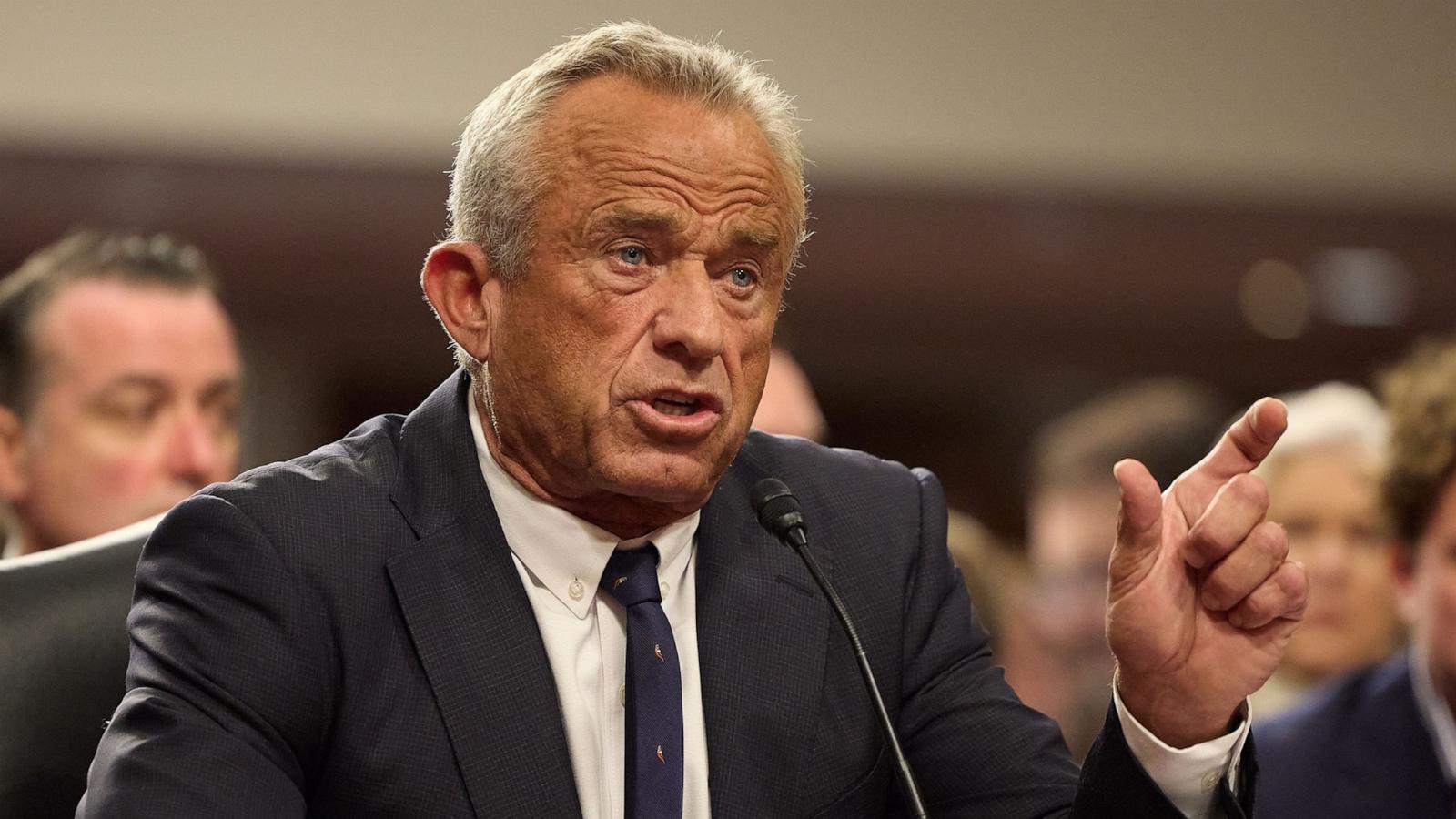
In the first of two public sit-downs with the Senate that will decide his possible future as secretary of the Department of Health and Human Services, Robert F. Kennedy Jr. faced nearly four hours of questions about his decadeslong public record.
Kennedy, a former Democrat from a legacy political family who threw his weight behind President Donald Trump in 2024 with the “Make America Healthy Again” movement, is a longtime environmental lawyer. He’s perhaps most known for his work in questioning the safety and effectiveness of vaccines — a topic on Wednesday that he repeatedly sought to placate senators on, without much apparent luck among Democrats.
If confirmed, Kennedy would be in charge of overseeing a vast federal agency that manages the health care of some 170 million Americans, regulates access to drugs and vaccines, and tracks urgent outbreaks of diseases and foodborne illnesses.
Kennedy returns to the Senate on Thursday for another hearing. Here are the key takeaways from day one:

Robert F. Kennedy Jr., President Donald Trump’s choice to be Secretary of Health and Human Services, appears before the Senate Finance Committee for his confirmation hearing, at the Capitol in Washington, Jan. 29, 2025.
Allison Dinner/EPA-EFE/Shutterstock
RFJ Jr. appears to change his stance on vaccines
Kennedy said several times during his hearing on Wednesday that he supports vaccines, often in blunter terms and with more vigor than his previous public comments. But that rhetoric contradicted years of false statements he has made about the dangers of vaccines and misinformation about vaccines.
“News reports have claimed that I’m anti-vaccine or any industry. I am neither. I am pro-safety,” Kennedy said in his opening statement. While Kennedy has, in the past, denied he is “anti-vaccine” and has said his children have been vaccinated, he has promoted views on vaccines that decades of evidence has refuted.
He pledged, after a grilling Wednesday from Democratic Sen. Ron Wyden of Oregon, to “do nothing as HHS secretary that makes it difficult or discourages people from taking” the measles and polio vaccines.
“I support the measles vaccine. I support the polio vaccine,” Kennedy said.
Kennedy has openly questioned the widespread administration of those vaccines, saying during a podcast interview last year that he would not take the measles vaccine himself and downplaying the deadliness of the disease by attributing measles-related deaths in Africa to “malnutrition,” not the disease itself.
However, both measles and polio can be deadly. Before the measles vaccine was introduced in the United States, roughly 400 to 500 people died each year, according to the Centers for Disease Control and Prevention. Before the polio vaccine was developed, the virus killed or paralyzed nearly half a million people worldwide each year in the mid-20th century, according to the World Health Organization.
Kennedy also expressed support during the hearing for the childhood vaccine schedule, which suggests what vaccines children should get and when, despite the stream of criticism he has leveled in recent years.
Kennedy has falsely linked the vaccine schedule to a rise in chronic disease, saying during a campaign event last year, “What I’m focused on is the bigger issue of chronic disease, and that is linked to the vaccine schedule in some cases, the explosion of chronic disease.”
Kennedy has also been critical of the number of vaccines children receive.
Childhood vaccines have steadily increased in recent decades as new shots have been approved following robust clinical trials on their safety and efficacy, increasing the number of diseases that are now preventable via vaccine, the CDC says.
According to the CDC, even if babies receive several vaccinations in one day, their immune systems are under significantly more pressure from the bacteria and viruses they encounter daily in their environment.
Picking up on Kennedy’s shift on vaccines on Wednesday, Sen. Bernie Sanders, I-Vt., asked Kennedy about onesies sold on the website of an organization of which Kennedy is a founder, the nonprofit Children’s Health Defense, which pursues anti-vaccine causes. The onesies were stamped with phrases such as “Unvaxxed, Unafraid,” and “No Vax, No Problem.”
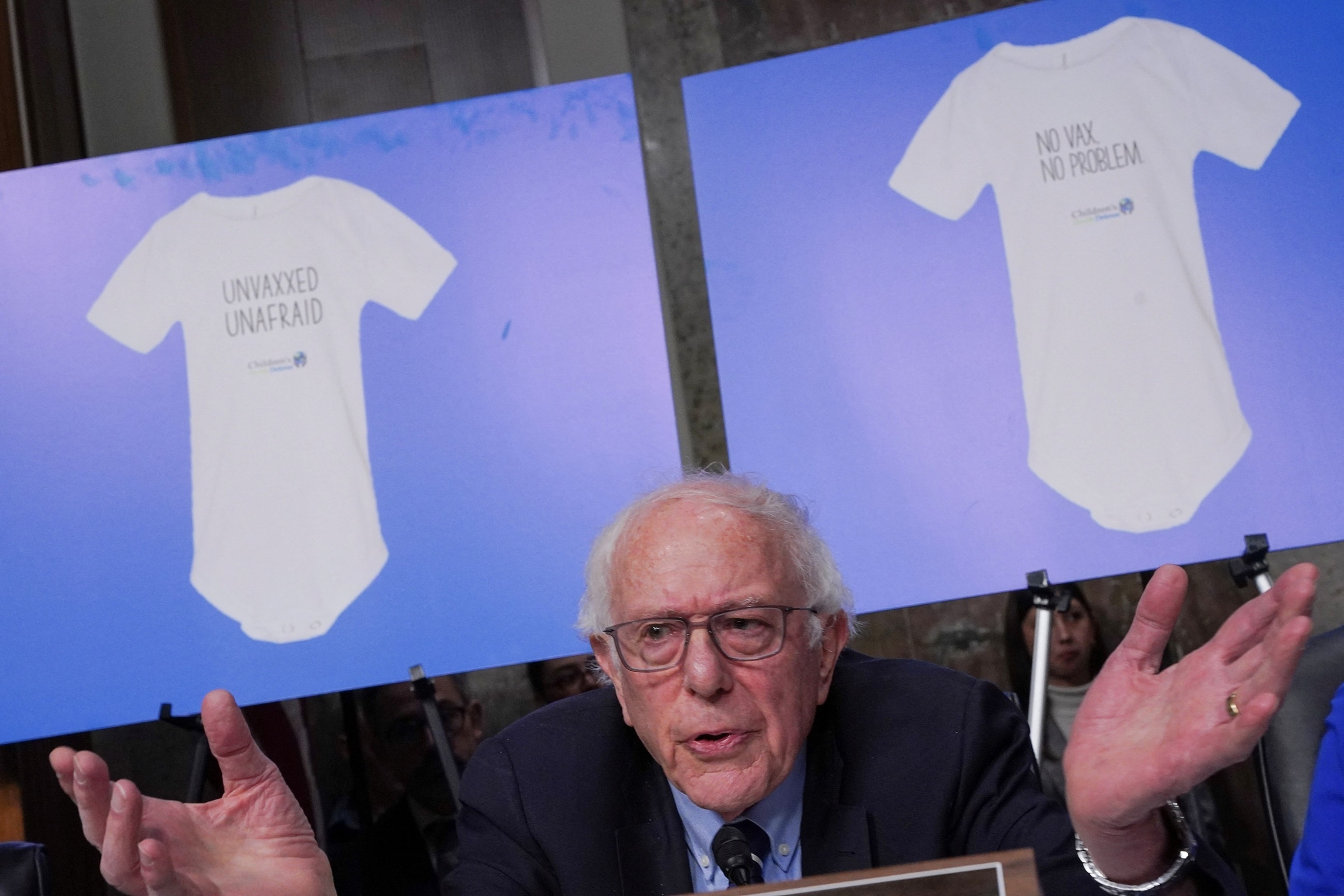
Sen. Bernie Sanders gestures, infront of displays featuring images of a Children’s Health Defense T-shirts, during a Senate Finance Committee confirmation hearing on Robert F. Kennedy Jr.’s nomination to be Secretary of Health and Human Services, in Washington, Jan. 29, 2025.
Nathan Howard/Reuters
“Can you tell us now that you will, now that you are pro-vaccine, that you’re going to have your organization take these products off the market?” Sanders asked.
Kennedy said he had resigned from the board and holds “no power over that organization.”
After shifting abortion position, RFK Jr. promises to “implement [Trump’s] policies”
When asked Wednesday about his views on abortion, which swung drastically throughout his campaign, Kennedy hemmed tightly to President Trump’s position on the issue, saying he thinks “the states should control abortion.”
Kennedy’s own public stance on abortion has varied wildly throughout his presidential campaign, and he at times advocated for reproductive rights that would be in direct conflict with Trump’s campaign promises.
“I agree with President Trump that every abortion is a tragedy. I agree with him that we cannot be a moral nation if we have 1.2 million abortions a year. I agree with him that the states should control abortion,” Kennedy said on Wednesday.
Kennedy said he would support Trump in working to “end late-term abortions,” a non-medical phrase used by the anti-abortion movement to describe abortions late in pregnancy, which the Guttmacher Institute says account for less than 1% of abortions and are frequently the result of complex medical issues.
Kennedy also vouched to protect “conscience exemptions,” which would expand protections for health care providers who don’t want to perform abortion procedures, allowing more providers to deny care.
“Forcing somebody to participate in a medical procedure as a provider that they believe is murder does not make any sense to me,” Kennedy said.
Kennedy also committed to looking into mifepristone, the abortion pill that is used in nearly two-thirds of abortions nationwide. He said he would direct the Food and Drug Administration to look into the safety of the pill and consider rolling back telemedicine access to the pill — both actions that could have wide-ranging impacts on access to the drug, which the FDA has determined safe to use as indicated and directed.
“President Trump has asked me to study the safety of mifepristone. He has not yet taken a stand on how to regulate it. Whatever he does, I will implement those policies,” Kennedy said.
“I’m going to — I serve at the pleasure of the president. I’m going to implement his policies,” Kennedy said.
But as recently as March 2024, Kennedy told Reuters he thought it should be a woman’s right to make a decision about abortion “throughout the pregnancy.” He has also said he supports the same access and limitations that were provided by Roe v. Wade, which legalized abortion in all U.S. states.
Since Trump nominated him to lead Health and Human Services, Kennedy has faced stiff blowback from conservatives, notably former Vice President Mike Pence, who claim he is not sufficiently anti-abortion.

Robert F. Kennedy Jr., President Donald Trump’s choice to be Secretary of Health and Human Services, appears before the Senate Finance Committee for his confirmation hearing, at the Capitol in Washington, Jan. 29, 2025.
Nathan Howard/Reuters
Sen. Maggie Hassan, D-N.H., pushed Kennedy on his repeated shifts on the issue of reproductive rights.
“You have clearly stated in the past that bodily autonomy is one of your core values. The question is, do you stand for that value or not? When was it that you decided to sell out the values you’ve had your whole life in order to be given power by President Trump?” she said.
“Senator, I agree with President Trump that every abortion is a tragedy,” Kennedy said.
Past comments come back to haunt RFK Jr.
Sen. Michael Bennet, D-Colo., read aloud alleged past comments made by Kennedy, including unfounded claims about transgender children.
“Did you say that exposure to pesticides causes children to become transgender?” Bennet asked.
“No, I never said that,” Kennedy replied.
However, Kennedy has repeated an unfounded conspiracy theory suggesting endocrine disruptors, including phthalates — which make chemicals more durable — and pesticides, can influence sexual orientation or gender identity.
“I want to just pursue just one question on these, you know, the other endocrine disruptors because our children now, you know, we’re seeing these impacts that people suspect are very different than in ages past about sexual identification among children and sexual confusion, gender confusion,” Kennedy said during an episode of his podcast in June 2022. “These kinds of issues that are very, very controversial today.”
Seemingly unclear understanding of Medicaid under HHS
Kennedy seemed to stumble when discussing aspects of the agency he would be tasked with running if he were to be confirmed as HHS secretary.
He claimed Medicaid, a federal health insurance program for disabled and low-income Americans, is “not working.”

Robert F. Kennedy Jr., President Trump’s nominee to be Secretary of Health and Human Services, testifies before a Senate Finance Committee confirmation hearing on Capitol Hill in Washington, Jan. 29, 2025.
Nathan Howard/Reuters
“Most people who are on Medicaid are not happy. The premiums are too high. The deductibles are too high,” Kennedy said during his hearing.
However, except in very narrow circumstances, there are no premiums or deductibles under Medicaid.
Kennedy also claimed that “almost nothing is studied” at the National Institutes of Health about the etiology, or the cause, of “our chronic disease epidemic.”
There are several institutes and centers at the NIH dedicated to researching chronic diseases, as well as training health care professionals and disseminating information.

